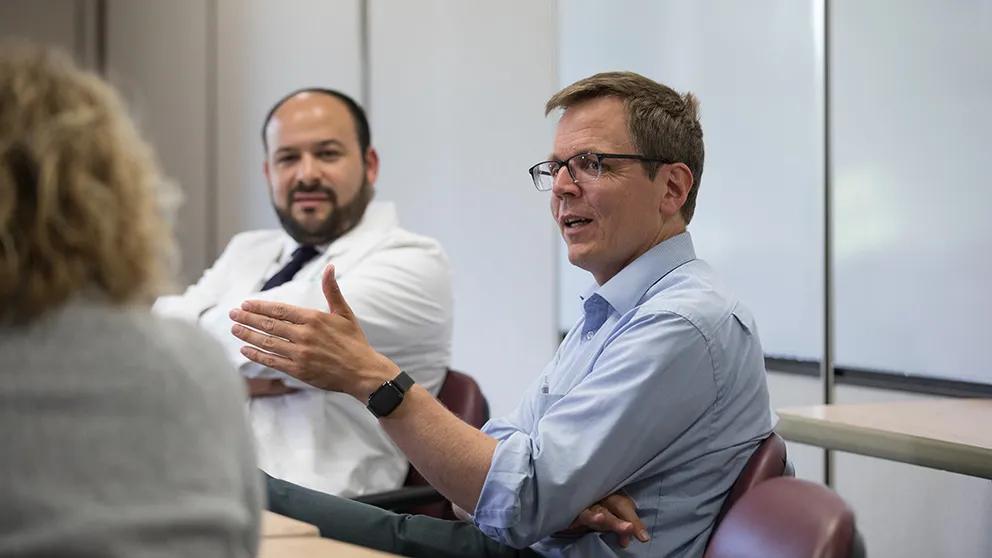Advanced care for Maines most isolated cancer patients
The Search Magazine Article | September 9, 2019Jefferson Cary Cancer Center brings Maine Cancer Genomics Initiative options to Aroostook County
Interstate 95 starts south of Miami and heads north, connecting every East Coast state of the U.S. on its way, ending at Houlton, Maine at the border of eastern Canada. To continue north you have to exit I-95 and get on Route 1. And before you hit Canada again, you’ll come to Caribou, Maine, population 7,684.
By the time patients come up to our clinic, they may have two or more different malignancies at the same time, or are in advanced stages where a cure is no longer possible.
There’s no way not to notice that this is potato country. In midsummer the neat mounded rows of green, dotted with white blossoms, extend far into the horizon like a corrugated rooftop over the planet. At the northern edge of Caribou is Cary Medical Center, a medical and veterans’ complex where even the parking lot borders potato fields.
At the entrance to Jefferson Cary Cancer Center, Dr. Allan Espinosa greets his visitors with a big smile and a warm round of handshakes. With obvious pride, he introduces us to the staff and leads us around the offices and exam rooms, the infusion chairs where patients receive their chemotherapy, and the private room where doctors review x-rays and discuss prognosis and treatment with patients and their families.
“We’re a small place, but we care,” Espinosa says. “We want people to know that we care about everything we do, and that we're here for the patients and their families.”
Espinosa and his colleagues at Jefferson Cary Cancer Center serve oncology patients all over Aroostook County — which Mainers call simply “the County.” At nearly 7,000 square miles, Aroostook is the largest county east of the Rocky Mountains, with a widely dispersed and rural population. Despite their geographic isolation, Espinosa’s cancer patients have access to the latest advances in precision cancer care through the Maine Cancer Genomics Initiative.
The Jackson Laboratory designed MCGI to provide access to advanced testing and treatment to the state’s cancer patients, most of whom are treated at small community hospitals like Jefferson Cary. Founded in 2016 with a grant from the Harold Alfond Foundation, MCGI has already enrolled every oncology practice in Maine, and most of its oncologists, including Espinosa.

A unique group of patients
Though Maine is one of the least racially diverse states in the country, Aroostook County is surprisingly ethnically and genetically diverse. The County is home to two Native American communities, bands of the Micmac and Maliseet tribes. The first European settlers were French, and Acadian communities and the French language still thrives throughout the County today. Scotch and Scotch-Irish settlers began arriving in the early 18th century, bringing their potato-farming expertise to the region, and the town of Allagash maintains their cultural heritage. Swedes established New Sweden, Stockholm and other towns, and still hold festivals celebrating Swedish traditions. Most recently, Amish farmers have come to Smyrna and Easton to sustain their way of life.
“This makes it a very interesting, unique group of patients with their own heritage, their own genetic makeup,” Espinosa says. “I believe it's a perfect place also to study environment versus heritage, nature versus nurture, especially with regard to inheritance of cancer syndromes.”
Espinosa was born and educated in Nicaragua, coming to the U.S. for a postdoctoral fellowship in thyroid cancer research and his residency in internal medicine at Ohio State University Medical Center. It was during his fellowship in hematology and oncology at Vanderbilt University Medical Center that he needed to fulfill a requirement to spend three years in an underserved or rural population. “Caribou was the place my family and I liked the most when I was interviewing around,” he says. “It’s a great place to raise a family, with lots of outdoor activities, and very friendly, welcoming people.”
In the state of Maine, where cancer is the leading cause of death, and its citizens have a higher-than-average risk of cancer and a higher cancer mortality rate than the rest of the nation, Espinosa’s Aroostook County patients are especially vulnerable.
“We have an aging population that has been exposed to pesticides and other agricultural hazards over the years. Many people here have also been exposed to other environmental hazards while working in paper mills, logging and lumber.” The sheer paucity of medical practices means less cancer screening than in more urban areas, he says, with the result that “by the time patients come up to our clinic, they may have two or more different malignancies at the same time, or are in advanced stages where a cure is no longer possible.”

Resources for patients in need
Moreover, Caribou’s geographic isolation means reduced access to advanced cancer care for patients. “Cancer care is a multidisciplinary practice, and many necessary subspecialties, technologies and clinical trials are not available in the County. Coordinating with tertiary-care centers in Bangor and Portland requires five or six hours of travel time for patients.” Espinosa notes that even blood banking is not available in full capacity. “For patients to receive some blood products, it requires three hours’ wait time to get deliveries from Bangor.”
Here in the northeastern corner of the United States, winter storms can occur six months of the year, making those long car trips on rural roads even more daunting. A2017 study conducted for the Maine Cancer Foundation determined that cancer patients in Maine face significant transportation barriers that impact their ability to receive care.
Besides the hours of travel on rural roads, the study cites the state’s lack of public transportation options. Patients may not be able to afford owning a vehicle or use a taxi or car service, they may lack family or friends available to drive them to appointments, or they may simply be too ill to drive.
Kaitlyn Umphrey is the Jefferson Cary Cancer Center’s nurse navigator, helping patients coordinate travel to receive treatment. “I connect patients with resources to help them get to appointments,” she says. “I struggle with connecting patients to volunteer drivers, and have had to utilize taxi services and public transportation in some situations. Which, as you can imagine, is not ideal due to the health conditions of the population we serve.” A local nonprofit, Brian’s Ride Cancer Fund, has received funding from the Maine Cancer Foundation to help with transportation.
“Dr. Espinosa has done home visits to patients throughout the County who may be too sick to travel to appointments,” Umphrey adds.

Bridging the gap in cancer care
When Espinosa learned of the MCGI, he realized it offered potentially significant ways to help his sickest patients, well beyond making house calls. He quickly became an early and enthusiastic adopter, and has already enrolled more than 40 stage-four cancer patients in the advanced testing and treatment protocols.
“I found out about the MCGI through networking when I moved to the area,” Espinosa says. “I was welcomed by Dr. Tom Openshaw from the Lafayette Family Cancer Center, who introduced me to a great group of colleagues and oncologists from the Northern Light Cancer Center. Through them I met Dr. Jens Rueter of JAX, who's the principal investigator of the Maine Cancer Genomic Initiative. He invited me from the beginning to be a part of the steering committee and I supported this initiative 100 percent. It's been a great experience working with all the oncologists from the state of Maine through this initiative.”
Rueter describes Espinosa as “a great advocate for rural cancer patients here in northern Maine. He has been one of our most active patient enrollers in the MCGI and has been an important voice at the table when we discuss the MCGI with our clinical steering committee. Caribou is really lucky to have such a dedicated oncologist in their ranks.”
The MCGI gives clinicians access to advanced cancer diagnostic tools, based on the unique genetic profile of each patient. There is no cost to Maine patients, enabling even the most underserved areas of Maine to have access to this new technology. Genomic tumor boards — specialized teams of oncologists, researchers and clinicians — convene in person and by videoconference to review patients’ test results and design personalized treatment plans for the patients. Patients also receive assistance in identifying and applying for clinical trials that are appropriate to their diagnoses.
To date, Espinosa’s team has recruited 43 cancer patients to MCGI, and treatment regimens have already been revised for four of the patients based on their test results. Espinosa says he tells all his patients that, even if their tests don’t immediately lead to new treatment options, “they may help in the fourth, fifth or sixth line of therapy down the line. It's really giving us peace of mind on long-term management. Patients can stay local and receive treatments here before going to clinical trials outside the County.”
Cancer is a difficult disease to treat, Espinosa says, “because it's really hundreds of diseases lumped under the same umbrella. We now understand that not all breast cancers are the same, not all lung cancers are the same: Each cancer has its own unique genetic makeup.”
He says the genomic testing provided by the MCGI “opens doors” for his patients by providing world-class expertise to their cases with no associated financial or travel hardships. “It's also opening the door for off-label use of drugs, through the group at JAX that's helping us identify targeted treatments, and for access to clinical trials.”
Jefferson Cary Cancer Center’s participation in MCGI involves educating patients about genomic testing and clinical trials by Umphrey and Jennifer Plant, nurse manager of the Center and its associated clinics. “Most patients sign right up,” Espinosa says, “but some of them require two or three times going over the same information. I think this is easily turned around by providing more education and exposure.
“The Jackson Laboratory and MCGI are bridging a big gap for personalized cancer care for my patients,” he says. “It's provided a foundation to assure them and myself that we're doing everything we can to provide the latest technology and the latest treatments that will get them the care they need and deserve.”
